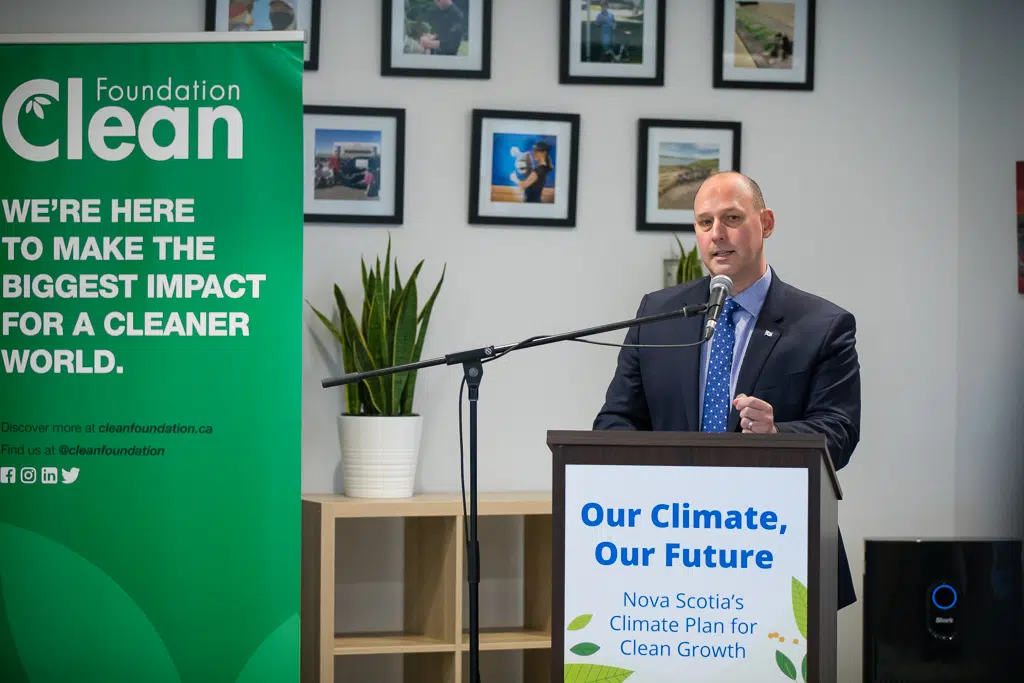
Environment Minister Tim Halman at the intial launch of the CCC program. Photo: N.S. Government.
Nova Scotia’s latest initiative to address climate challenges, the Community Climate Capacity (CCC) program, has announced its first 12 projects.
Launched in 2023, the CCC program, sponsored by the Nova Scotia Department of Environment and administered by the Dartmouth-based Clean Foundation, aims to support climate initiatives across the province.
The program was initially funded with $5 million in May, followed by an additional $1.6 million in February.
Environment Minister Timothy Halman and Scott Skinner, CEO of Clean Foundation, announced the projects receiving support at the Nova Scotia Federation of Municipalities Spring Conference held in Baddeck.
Skinner described the program as a structured effort to address climate challenges faced by different communities.
“Clean Foundation will provide vital staffing support,” Skinner said. “Planners, adaptation specialists, and climate experts will assist these communities in identifying and advancing their climate initiatives.”
The projects involve 16 municipalities, one Mi’kmaw community and two community organizations.
Initial 12 projects
- Town of Annapolis Royal, Town of Middleton, Municipality of the County of Annapolis
- Development of a joint climate change action plan
- Address sea level rise
- Mitigate the impacts of climate change along the coast
- Town of Shelburne, Municipality of the District of Shelburne, Municipality of Barrington
- Update climate plan
- Identify climate risks
- Cape Breton Regional Municipality
- Use nature-based solutions to enhance community resilience to climate change
- Town of Kentville
- Public education on climate issues
- Research energy production methods for community needs
- Improve stormwater management and urban greenery
- Municipality of Colchester
- Support climate adaptation focusing on:
- Wildfire risk
- Wastewater treatment
- Coastal parks and trails adaptation
- Support climate adaptation focusing on:
- Municipality of East Hants
- Include climate considerations in asset management planning
- Develop a sustainability strategy
- Municipality of the District of St. Mary’s
- Update and deliver climate plan focusing on:
- Coastal impacts
- Flood-line mapping
- Climate mitigation efforts
- Update and deliver climate plan focusing on:
- Municipality of Pictou County, Town of Pictou, Pictou County Partnership
- Use climate projections in waterfront planning
- Create green jobs
- Collaborate with neighbouring municipalities on climate action
- Municipality of the District of Lunenburg and Town of Mahone Bay
- Focus on adaptation and mitigation:
- Natural assets management
- Coastal wetlands
- Urban forest management
- Focus on adaptation and mitigation:
- Town of Truro
- Develop and deliver a climate plan
- Measure and reduce greenhouse gas emissions
- We’koqma’q First Nation
- Develop a climate plan
- Explore renewable energy to aim for net-zero status
- Waste reduction
- Weymouth Falls Community Land Trust
- Develop a climate public education plan
- Address food security through:
- Local food production
- Responsible land stewardship
The focus of many of the initial 12 projects is on developing or updating climate action plans.
For example, the Cape Breton Regional Municipality (CBRM) aims to use the program’s resources to accelerate the identification and management of natural assets for environmental protection.
CBRM Mayor Amanda McDougall-Merrill said, “This funding will help us to better utilize our natural environments like wetlands and forests in our climate action efforts.”
You can find more details on the CCC program, including application information on the Clean Foundation website.









